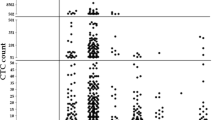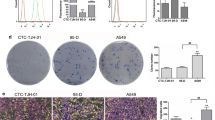Abstract
The presence of Circulating tumor cells (CTCs) has been proven to be correlated with disease progression and the patient’s response to treatment. However, the culture of CTCs for clinical utility is still a big challenge. We have developed a short-term method that enables CTCs culture and provides an opportunity to monitor drug susceptibility testing in individual patients. In a proof-of-concept study, we established a unique method using Matrigel® coated in 96 well plate to enable cancer cell clusters to attach and proliferate. The culture method using Matrigel® provides in vitro conditions and improves the attachment and differentiation of anchorage-dependent epithelial cells proliferation and mimics the tumor microenvironment. We further treated the cells attached to Matrigel® with the same drug regimen as the patient has undergone. Around 30.7% of the CTCs were viable after the drug treatment. We also correlated the decrease in cell viability after drug treatment with the reduction in the pleural effusion of the patient as seen by the images obtained from CT scans pre-and post-treatment. Moreover, as per the RECIST criterion, the patient had exhibited a positive response to the treatment. The short-term culturing of CTC along with the drug susceptibility testing offers a novel method to predict patient response to the treatment and could be utilized for screening suitable drug combinations for personalized treatment.




Similar content being viewed by others
References
Micalizzi DS, Maheswaran S, Haber DA. A conduit to metastasis: circulating tumor cell biology. Genes Dev. 2017;31:1827–40.
Pantel K, Speicher MR. The biology of circulating tumor cells. Oncogene. 2016;35:1216–24.
Cristofanilli M, Budd GT, Ellis MJ, Stopeck A, Matera J, Miller MC, Reuben JM, Doyle GV, Allard WJ, Terstappen LW, et al. Circulating tumor cells, disease progression, and survival in metastatic breast cancer. N Engl J Med. 2004;351:781–91.
Lorente D, Olmos D, Mateo J, Dolling D, Bianchini D, Seed G, Flohr P, Crespo M, Figueiredo I, Miranda S, et al. Circulating tumour cell increase as a biomarker of disease progression in metastatic castration-resistant prostate cancer patients with low baseline CTC counts. Ann Oncol. 2018;29:1554–60.
Castro-Giner F, Aceto N. Tracking cancer progression: from circulating tumor cells to metastasis. Genome Med. 2020;12:31.
Huang Q, Hu X, He W, Zhao Y, Hao S, Wu Q, Li S, Zhang S, Shi M. Fluid shear stress and tumor metastasis. Am J Cancer Res. 2018;8:763–77.
Kim Y-N, Koo KH, Sung JY, Yun U-J, Kim H. Anoikis resistance: an essential prerequisite for tumor metastasis. Int J Cell Biol. 2012;2012: 306879.
Massague J, Obenauf AC. Metastatic colonization by circulating tumour cells. Nature. 2016;529:298–306.
Regmi S, Fu A, Luo KQ. High shear stresses under exercise condition destroy circulating tumor cells in a microfluidic system. Sci Rep. 2017;7:39975.
Wang WC, Zhang XF, Peng J, Li XF, Wang AL, Bie YQ, Shi LH, Lin MB. Survival mechanisms and influence factors of circulating tumor cells. Biomed Res Int. 2018;2018:6304701.
Alix-Panabieres C, Pantel K. Challenges in circulating tumour cell research. Nat Rev Cancer. 2014;14:623–31.
Balakrishnan A, George IA, Kumar P. Circulating tumor cells as an emerging tool in cancer therapy. Front Biosci (Landmark Ed). 2020;25:606–31.
Alix-Panabieres C, Mader S, Pantel K. Epithelial–mesenchymal plasticity in circulating tumor cells. J Mol Med (Berl). 2017;95:133–42.
Jain AP, Sambath J, Sathe G, George IA, Pandey A, Thompson EW, Kumar P. Pan-cancer quantitation of epithelial-mesenchymal transition dynamics using parallel reaction monitoring-based targeted proteomics approach. J Transl Med. 2022;20:84.
Khoo BL, Kumar P, Lim CT, Thiery JP. Genesis of circulating tumor cells through epithelial–mesenchymal transition as a mechanism for distant dissemination. In: Cote RJ, Datar RH, editors. Circulating tumor cells. New York: Springer; 2016. p. 139–82.
Yadavalli S, Jayaram S, Manda SS, Madugundu AK, Nayakanti DS, Tan TZ, Bhat R, Rangarajan A, Chatterjee A, Gowda H, et al. Data-driven discovery of extravasation pathway in circulating tumor cells. Sci Rep. 2017;7:43710.
Khoo BL, Lee SC, Kumar P, Tan TZ, Warkiani ME, Ow SG, Nandi S, Lim CT, Thiery JP. Short-term expansion of breast circulating cancer cells predicts response to anti-cancer therapy. Oncotarget. 2015;6:15578–93.
Balakrishnan A, Koppaka D, Anand A, Deb B, Grenci G, Viasnoff V, Thompson EW, Gowda H, Bhat R, Rangarajan A, et al. Circulating tumor cell cluster phenotype allows monitoring response to treatment and predicts survival. Sci Rep. 2019;9:7933.
De T, Goyal S, Balachander G, Chatterjee K, Kumar P, Babu KG, Rangarajan A. A novel ex vivo system using 3D polymer scaffold to culture circulating tumor cells from breast cancer patients exhibits dynamic E-M phenotypes. J Clin Med. 2019;8(9):1473.
Cayrefourcq L, Mazard T, Joosse S, Solassol J, Ramos J, Assenat E, Schumacher U, Costes V, Maudelonde T, Pantel K, et al. Establishment and characterization of a cell line from human circulating colon cancer cells. Can Res. 2015;75:892–901.
Gao D, Vela I, Sboner A, Iaquinta PJ, Karthaus WR, Gopalan A, Dowling C, Wanjala JN, Undvall EA, Arora VK, et al. Organoid cultures derived from patients with advanced prostate cancer. Cell. 2014;159:176–87.
Maheswaran S, Haber DA. Ex vivo culture of ctcs: an emerging resource to guide cancer therapy. Can Res. 2015;75:2411–5.
Yu M, Bardia A, Aceto N, Bersani F, Madden MW, Donaldson MC, Desai R, Zhu H, Comaills V, Zheng Z, et al. Cancer therapy. ex vivo culture of circulating breast tumor cells for individualized testing of drug susceptibility. Science. 2014;345:216–20.
Khoo BL, Grenci G, Jing T, Lim YB, Lee SC, Thiery JP, Han J, Lim CT. Liquid biopsy and therapeutic response: circulating tumor cell cultures for evaluation of anticancer treatment. Sci Adv. 2016;2: e1600274.
Abdel-Karim I, Plunkett WK Jr, O’Brien S, Giles F, Thomas D, Faderl S, Ravandi F, Rios MB, Du M, Schneck KB, et al. A phase I study of pemetrexed in patients with relapsed or refractory acute leukemia. Invest New Drugs. 2011;29:323–31.
Wada T, Fukuda T, Kawanishi M, Tasaka R, Imai K, Yamauchi M, Kasai M, Hashiguchi Y, Ichimura T, Yasui T, et al. Pharmacokinetic analyses of carboplatin in a patient with cancer of the fallopian tubes undergoing hemodialysis: a case report. Biomed Rep. 2016;5:199–202.
Mangalaparthi KK, Patel K, Khan AA, Manoharan M, Karunakaran C, Murugan S, Gupta R, Khanna-Gupta A, Chaudhuri A, Kumar P, et al. Mutational landscape of esophageal squamous cell carcinoma in an indian cohort. Front Oncol. 2020;10:1457.
Meacham CE, Morrison SJ. Tumour heterogeneity and cancer cell plasticity. Nature. 2013;501:328–37.
Gambarin-Gelwan M, Wolf DC, Shapiro R, Schwartz ME, Min AD. Sensitivity of commonly available screening tests in detecting hepatocellular carcinoma in cirrhotic patients undergoing liver transplantation. Am J Gastroenterol. 2000;95:1535–8.
Gambhir SS. Molecular imaging of cancer with positron emission tomography. Nat Rev Cancer. 2002;2:683–93.
Jain RK, Duda DG, Willett CG, Sahani DV, Zhu AX, Loeffler JS, Batchelor TT, Sorensen AG. Biomarkers of response and resistance to antiangiogenic therapy. Nat Rev Clin Oncol. 2009;6:327–38.
Kim C, Paik S. Gene-expression-based prognostic assays for breast cancer. Nat Rev Clin Oncol. 2010;7:340–7.
Briske-Anderson MJ, Finley JW, Newman SM. The influence of culture time and passage number on the morphological and physiological development of Caco-2 cells. Proc Soc Exp Biol Med Soc Exp Biol Med. 1997;214:248–57.
Chang-Liu CM, Woloschak GE. Effect of passage number on cellular response to DNA-damaging agents: cell survival and gene expression. Cancer Lett. 1997;113:77–86.
Wenger SL, Senft JR, Sargent LM, Bamezai R, Bairwa N, Grant SG. Comparison of established cell lines at different passages by karyotype and comparative genomic hybridization. Biosci Rep. 2004;24:631–9.
Hanahan D, Weinberg RA. Hallmarks of cancer: the next generation. Cell. 2011;144:646–74.
Hodgkinson CL, Morrow CJ, Li Y, Metcalf RL, Rothwell DG, Trapani F, Polanski R, Burt DJ, Simpson KL, Morris K, et al. Tumorigenicity and genetic profiling of circulating tumor cells in small-cell lung cancer. Nat Med. 2014;20:897–903.
Acknowledgements
PK is a recipient of the Ramanujan Fellowship awarded by the Department of Science and Technology (DST), Government of India. AB is the recipient of SRF from the Council of Scientific & Industrial Research (CSIR), Government of India. The authors declare no potential conflicts of interest.
Funding
This study is not funded by any funding agencies.
Author information
Authors and Affiliations
Contributions
AB: Cell culture experiments, data curation & writing of the original draft. AGF Thottian: Sample collection & patient follow-up. GB: Sample collection, patient follow-up & writing of original draft, PK: Methodology & writing of the original draft.
Corresponding authors
Ethics declarations
Conflict of interest
The authors declare no potential conflicts of interest.
Ethical approval
This study was approved by the ethics committee of Kidwai Memorial Institute of Oncology, Bangalore, India. Moreover, informed consent has been obtained from all the patients included in the study. The authors declare that the study was performed in accordance with the ethical standards as laid down in the 1964 Declaration of Helsinki and its later amendments or comparable ethical standards.
Consent to participate
Informed consent has been obtained from all the patients included in the study.
Consent for publication
The authors affirm that human research participants provided informed consent for publication of the images in Figs. 2, 3 and 4 and Supplementary Table 1.
Additional information
Publisher's Note
Springer Nature remains neutral with regard to jurisdictional claims in published maps and institutional affiliations.
Supplementary Information
Below is the link to the electronic supplementary material.
Rights and permissions
Springer Nature or its licensor holds exclusive rights to this article under a publishing agreement with the author(s) or other rightsholder(s); author self-archiving of the accepted manuscript version of this article is solely governed by the terms of such publishing agreement and applicable law.
About this article
Cite this article
Balakrishnan, A., Thottian, A.G.F., Govind Babu, K. et al. Drug susceptibility testing of circulating lung cancer cells for personalized treatment. Med Oncol 40, 1 (2023). https://doi.org/10.1007/s12032-022-01860-3
Received:
Accepted:
Published:
DOI: https://doi.org/10.1007/s12032-022-01860-3




